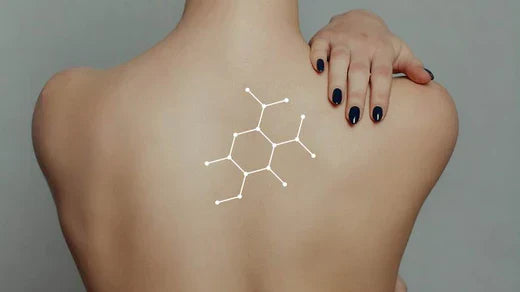Collageen is het meest voorkomende eiwit in je lichaam. En wat doet collageen: het speelt een cruciale rol bij het behoud van de structuur en stevigheid van je huid, haar, nagels. Helaas neemt de natuurlijke productie van collageen af naarmate we ouder worden, meestal vanaf ons 25e levensjaar. Tegen de tijd dat we 50 zijn, wordt er zelfs geen collageen meer aangemaakt.
Eiwitten
Laten we eerst eens kijken naar eiwitten in het algemeen. Eiwitten zijn aanwezig in veel dierlijke producten, zoals vlees, vis en eieren, maar ook in kleinere hoeveelheden in plantaardige bronnen zoals peulvruchten. Deze eiwitten zijn samengesteld uit verschillende aminozuren, de bouwstenen die samen een eiwit vormen. In totaal telt ons lichaam 22 verschillende aminozuren voor verschillende processen. Collageen, een belangrijk eiwit, bevat 18 van deze aminozuren.
Viscollageen vertoont de grootste gelijkenis met menselijk collageen, waardoor het gemakkelijker door ons lichaam kan worden opgenomen. Als je kiest voor bijvoorbeeld vegan collageen, zal je lichaam na inname dit omzetten naar de juiste samenstelling.
Waar zit collageen in?
Zoals eerder benoemd is collageen een eiwit. Je kunt dit vinden in verschillende soorten voeding. Bijvoorbeeld dierlijke bronnen zoals: Bottenbouillon, vooral afkomstig van het bindweefsel en beenmerk. Ook in vis, rundvlees en eieren kan je collageen vinden. In plantaardige bronnen kan je bijvoorbeeld sojabonen eten, dit bevat bouwstoffen die je lichaam kunnen ondersteunen in de aanmaak van collageen. Bonen en linzen bevatten verschillende aminozuren die nodig zijn voor de productie van collageen.
Wat heeft een negatieve invloed op collageen?
Er zijn elementen die collageen (productie) aantasten of beschadigen. Een daarvan is veel UV staling, de UV straling kan cellen en DNA beschadigen. Wat effect kan hebben op de huid en de elasticiteit. Daarnaast verhoog je de toxische belasting doordat er vrije radicalen vrijkomen die ook het collageen kunnen beschadigen.
Ook de inname van veel suikers heeft invloed. Wanneer je suiker eet hechten de collageen eiwitten aan elkaar, dit zorgt ervoor dat je bloedsuikerspiegel stijgt en de elasticiteit van het collageen kan verminderen.
Daarnaast zorgt roken er ook voor dat er vrije radicalen in je lichaam komen die je collageen kunnen aantasten.
Vanaf je 25e levensjaar neemt de collageen productie van je lichaam af. Je kunt dit ondersteunen door voldoende en gevarieerde voeding te eten waar collageen in zit. Daarnaast kan je collageen ook suppleren om het aan te vullen.








